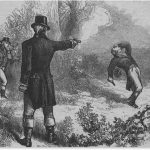Averil Nottage, local historian and former BRA Chair, tells us about a murky side of life in Chalk Farm in past centuries:
On the morning of Monday 12 January 1818 William Adams, of Little Chalk Farm, England’s Lane felt unwell. So, he was still in bed when he heard two firearm shots in quick succession shortly after 9 o’clock. From his window he saw four men standing in a field opposite his house – two facing each other, about 12 yards apart, with the others standing to one side. Realising that a duel was being fought, Mr Adams dressed quickly and rushed out, hoping that he could prevent anyone being injured. The field was about 50 yards from his house and just as he climbed over the gate, he heard two further shots and saw three men running towards a fourth man who was bleeding profusely. Mr Adams confiscated the pistols and observed that it was a most unfortunate affair, to which one of the men responded: “Yes, it is: it is not our quarrel originally, we are all friends.” The others agreed.
 The injured man, Lieutenant Edmund Bailey, was carried to Mr Adams’ house and laid on a sofa in his parlour. Mr George Rodd, a surgeon from Hampstead, was summoned but unable to save Lieutenant Bailey because of several injuries to his intestines. Before he died the Lieutenant shook hands with Mr O’Callaghan, who had shot him, and said he freely forgave him and that everything had been conducted most honourably. He asked Mr O’Callaghan if he would have forgiven him if he was in his place. Mr Callaghan replied, “Yes my dear fellow, I wish I had been wounded instead of you.”
The injured man, Lieutenant Edmund Bailey, was carried to Mr Adams’ house and laid on a sofa in his parlour. Mr George Rodd, a surgeon from Hampstead, was summoned but unable to save Lieutenant Bailey because of several injuries to his intestines. Before he died the Lieutenant shook hands with Mr O’Callaghan, who had shot him, and said he freely forgave him and that everything had been conducted most honourably. He asked Mr O’Callaghan if he would have forgiven him if he was in his place. Mr Callaghan replied, “Yes my dear fellow, I wish I had been wounded instead of you.”
Mr Adams sent for Thomas Hunt, the Hampstead constable, who arrested Mr O’Callaghan and the two friends who had acted as seconds. They were taken to Newgate Prison and tried at the Old Bailey on Friday 16 January. All three men were charged with feloniously, wilfully and with malice of forethought murdering Edmund Bailey. Ten respectable witnesses gave the prisoners excellent character references for their humanity and gentleness of mind. The jury found them guilty of the lesser charge of manslaughter for which they were imprisoned for 3 months.
It wasn’t surprising that Mr Adams was alert to duels as the peaceful meadows near Chalk Farm were a favourite meeting place for them in the 18th and early 19th centuries. With no houses between England’s Lane and the Chalk Farm Tavern (where the Lemonia Restaurant now stands), and trees screening the fields, they provided perfect privacy.
In 1806 an Irish poet, Thomas Moore, published “Epistles, Odes and Other Poems” that were deeply critical of America. Francis Jeffrey condemned him as “the most licentious of modern versifiers” in the Edinburgh Review. Moore retaliated by challenging him to a duel at dawn on 11 August 1806 in Chalk Farm. Both men were totally ignorant of the practicalities of duelling. A friend, who lent pistols to Moore, informed the Bow Street Runners. So, as Moore and Jeffrey faced each other across a Chalk Farm meadow, the constables appeared. Both men and their seconds were taken into custody and bound over to keep the peace. Moore and Jeffrey subsequently became good friends and Byron recorded the foiled duel in “English Bards and Scottish Reviewers” (1809).
There was another literary duel in 1821. John Scott, the editor of the radical London Magazine, was affronted when the High Tory Blackwood Magazine dismissed what they called the “Cockney School” of poets including Leigh Hunt and John Keats. The argument played out in further articles in both journals. On 16 February 1821 Scott demanded an apology or “instant satisfaction”. When no apology was forthcoming, a duel was arranged for that evening at Chalk Farm. It was a clear moonlit night, but unfortunately Scott and his second were not familiar with the duelling codes. In the first round Jonathan Christie, his opponent, deliberately fired wide, which should have ended the process. However, because Scott’s second did not understand this, another round followed where Christie, in defending himself, mortally wounded Scott. Scott was taken to the Chalk Farm Tavern where he died on 27 February “without a groan.” He left a wife and two children. Jonathan Christie was charged with wilful murder but found not guilty.
By the 1820s there was strong public opposition to duelling which gradually faded out over the next few decades as buildings began to replace the pretty hay meadows of Chalk Farm.
